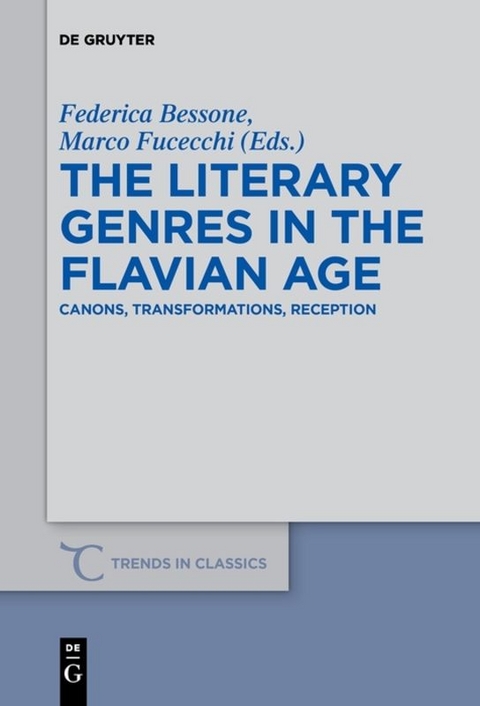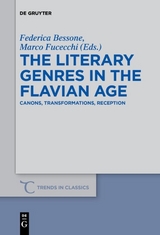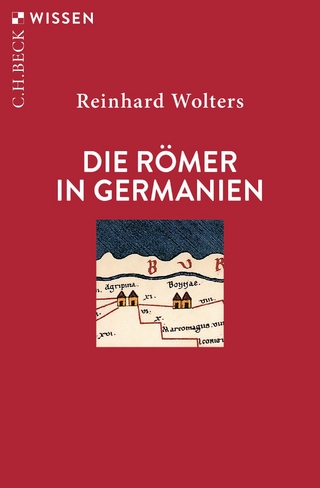The Literary Genres in the Flavian Age
Canons, Transformations, Reception
Seiten
2017
De Gruyter (Verlag)
978-3-11-053322-4 (ISBN)
De Gruyter (Verlag)
978-3-11-053322-4 (ISBN)
lt;br />Trends in Classics , a new series and journal to be edited by Franco Montanari and Antonios Rengakos, will publish innovative, interdisciplinary work which brings to the study of Greek and Latin texts the insights and methods of related disciplines such as narratology, intertextuality, reader-response criticism, and oral poetics. Both publications will seek to publish research across the full range of classical antiquity.
The series Trends in Classics Studies welcomes monographs, edited volumes, conference proceedings and collections of papers; it will provide an important forum for the ongoing debate about where Classics fits in modern cultural and historical studies.
The journal will be published twice a year with approx. 160 pp. per issue. Each year one issue will be devoted to a specific subject with articles edited by a guest editor.
The construction of a new Latin library between the end of the Republic and the Augustan Principate was anything but an inhibiting factor. The literary flourishing of the Flavian age shows that awareness of this canon rather stimulated creative tension. In the changing socio-cultural context, daring innovations transform the genres of poetry and prose. This volume, which collects papers by influential scholars of early Imperial literature, sheds light on the productive dynamics of the ancient genre system and can also offer insightful perspectives to a non-classicist readership.
The series Trends in Classics Studies welcomes monographs, edited volumes, conference proceedings and collections of papers; it will provide an important forum for the ongoing debate about where Classics fits in modern cultural and historical studies.
The journal will be published twice a year with approx. 160 pp. per issue. Each year one issue will be devoted to a specific subject with articles edited by a guest editor.
The construction of a new Latin library between the end of the Republic and the Augustan Principate was anything but an inhibiting factor. The literary flourishing of the Flavian age shows that awareness of this canon rather stimulated creative tension. In the changing socio-cultural context, daring innovations transform the genres of poetry and prose. This volume, which collects papers by influential scholars of early Imperial literature, sheds light on the productive dynamics of the ancient genre system and can also offer insightful perspectives to a non-classicist readership.
Federica Bessone, Università di Torino, Italy; Marco Fucecchi, Università degli Studi di Udine, Italy.
"This delightful book contains seventeen papers by leading experts in this field and gives us both breadth and depth in its analysis of the major writers of the Flavian period [...] this book proves (if proof were needed) that Flavian literature is every bit as rewarding to study as anything else, and we owe a huge debt of gratitude to these seventeen scholars for sharing their insights with us in such a well-written and accessible style."
John Goodwin in: Classics for All, 24.12.2017, https://classicsforall.org.uk/book-reviews/literary-genres-flavian-age-canons-transformations-reception/
| Erscheinungsdatum | 14.11.2017 |
|---|---|
| Reihe/Serie | Trends in Classics - Supplementary Volumes ; 51 |
| Verlagsort | Berlin/Boston |
| Sprache | englisch |
| Maße | 155 x 230 mm |
| Gewicht | 669 g |
| Themenwelt | Geschichte ► Allgemeine Geschichte ► Altertum / Antike |
| Geisteswissenschaften ► Sprach- / Literaturwissenschaft ► Literaturwissenschaft | |
| Schlagworte | Canon • Flavian Age • genre system |
| ISBN-10 | 3-11-053322-7 / 3110533227 |
| ISBN-13 | 978-3-11-053322-4 / 9783110533224 |
| Zustand | Neuware |
| Haben Sie eine Frage zum Produkt? |
Mehr entdecken
aus dem Bereich
aus dem Bereich




